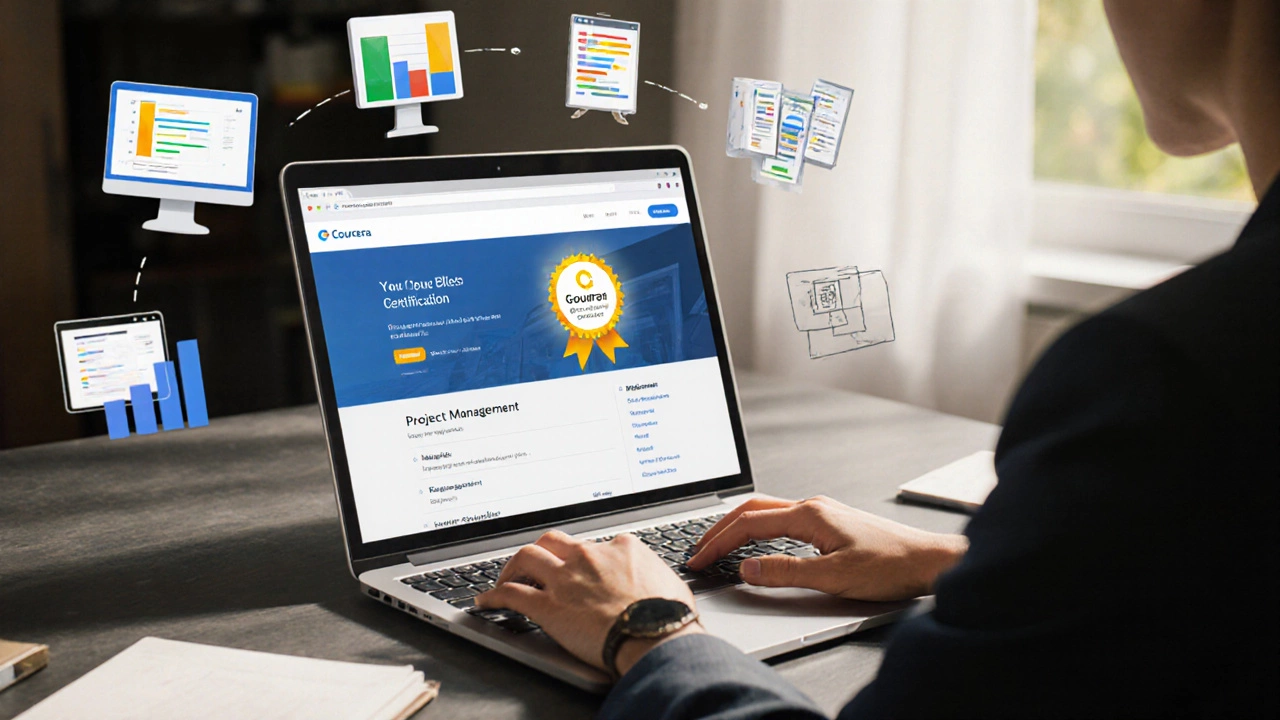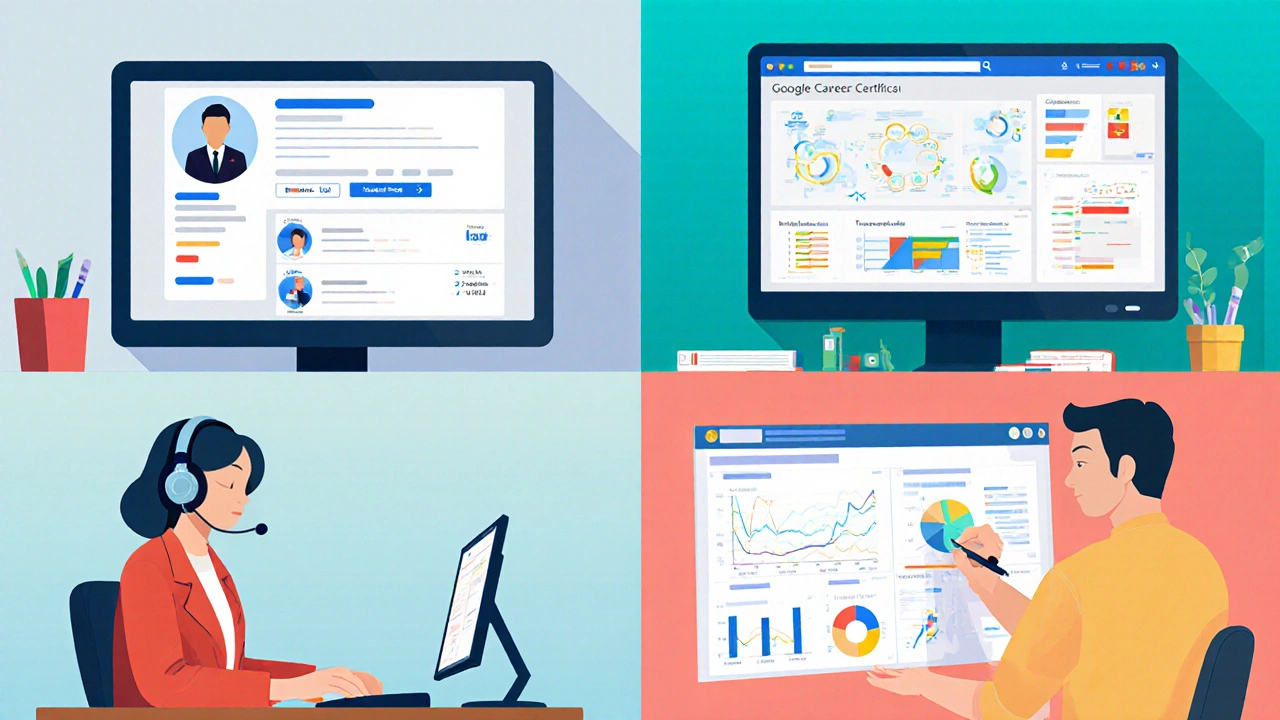Can You Get Hired with a Google Certificate? 2025 Guide
 Oct, 17 2025
Oct, 17 2025
Google Certificate Job Match Calculator
Calculate Your Job Fit
Job Match Results
Top Job Matches
Key Skills to Highlight
How to Improve Your Match
- Add your capstone project to your portfolio
- Update LinkedIn with Google-verified badge
- Network with alumni in your target field
What Employers Look For
Showcase your portfolio projects
Share stories of how you solved real-world issues
Highlight tools mentioned in job descriptions
Demonstrate communication and teamwork
Wondering whether a Google certificate can actually land you a job? You’re not alone. Every year thousands of learners finish a Google Career Certificate and ask the same question:“Will employers really value this badge?” This guide breaks down the hiring reality in 2025, shows where the certificate shines, points out the blind spots, and gives you a step‑by‑step plan to turn that digital credential into a paycheck.
What a Google Career Certificate Is
Google Career Certificates are industry‑aligned, online training programs created by Google and delivered through Coursera. Each program lasts about six months, costs under $400, and focuses on practical skills that hiring teams are actively looking for. The most popular tracks are IT Support, Data Analytics, Project Management, and UX Design.
How the Programs Are Structured
All certificates share a common framework:
- Self‑paced video lessons (average 20minutes each).
- Hands‑on labs using real Google tools - e.g., BigQuery for analytics or Jira for project tracking.
- Peer‑reviewed projects that become part of your portfolio.
- Final assessment scored by Google‑certified educators.
Finish the course and you receive a digital badge that can be added to LinkedIn, your résumé, or a personal website. The badge is backed by Google’s verification system, so employers can click to see a summary of the curriculum and your project scores.
The Hiring Landscape in 2025
Data from LinkedIn’s 2025 Jobs Report shows a 38% increase in listings that mention “Google Career Certificate” as a preferred qualification. Companies ranging from small startups to Fortune500 giants have added the badge to their applicant tracking filters. The top hiring sectors are:
- Tech support and help‑desk roles (IT Support Certificate).
- Business intelligence and data‑driven marketing (Data Analytics Certificate).
- Remote project coordination (Project Management Certificate).
- Product design and prototyping (UX Design Certificate).
Even traditional employers such as banks and healthcare providers now list the certificate alongside a bachelor’s degree for certain entry‑level positions.
What Employers Actually Look For
Hiring managers care less about the badge’s name and more about the concrete outcomes you can demonstrate. Here’s the mental checklist of a typical recruiter:
- Relevant project artifacts - screenshots, dashboards, wireframes, or support ticket simulations.
- Problem‑solving narrative - a brief story of how you tackled a real‑world issue in the capstone project.
- Soft‑skill alignment - communication, teamwork, and customer‑focus, especially for support roles.
- Technology stack match - familiarity with tools listed in the job ad (e.g., Google Cloud, Tableau, Asana).
In short, the certificate opens the door; your portfolio walks you through.

Boosting Your Application with the Certificate
Follow these five actions right after you earn the badge:
- Update your LinkedIn profile - add the badge, write a 2‑sentence summary of the capstone, and tag Google and Coursera.
- Create a public portfolio site - host project screenshots, embed GitHub repos, and write a concise case study for each certificate.
- Tailor your résumé - list the certificate under “Professional Development” and highlight the specific tools you mastered.
- Network with a Google Recruiter or alumni in your target industry. A short coffee chat can turn a badge into a referral.
- Apply with a targeted cover letter - reference the project that aligns with the role’s key responsibilities.
These steps turn a passive credential into an active job‑search weapon.
Real‑World Success Stories
Here are three quick examples from 2024‑2025 that illustrate what’s possible:
- Maria, 28, IT Support Certificate - After completing the badge, she landed a Tier‑2 support role at a UK fintech firm. Her capstone involved building a ticket‑routing script that reduced average resolution time by 12%.
- Jamal, 22, Data Analytics Certificate - Used a Tableau dashboard from his final project to impress a health‑tech startup. He was hired as a junior data analyst and now leads weekly data‑storytelling sessions.
- Sofia, 31, UX Design Certificate - Leveraged her redesign of a mock e‑commerce checkout flow to secure a UI/UX internship at a major retailer, later converted to a full‑time junior designer.
Each story shares a common thread: the candidate paired the badge with a concrete, shareable deliverable.
Google Certificate vs. Traditional Degree: Quick Comparison
| Aspect | Google Certificate | Bachelor’s Degree |
|---|---|---|
| Duration | ~6 months (part‑time) | 3-4 years (full‑time) |
| Cost | Under $400 | $30k-$70k (US) |
| Skill focus | Job‑ready, tool‑specific | Theoretical foundation + electives |
| Employer perception (2025) | Increasingly valued for entry‑level roles | Still preferred for senior/managerial tracks |
| Portfolio requirement | Mandatory (project‑based) | Optional, depends on program |
The table makes it clear: a Google Certificate offers speed, affordability, and a built‑in portfolio. A degree still shines for long‑term career growth, but the badge can get your foot in the door much faster.

Checklist Before You Hit ‘Apply’
- Badge displayed on LinkedIn and résumé.
- Portfolio site live with at least one project per certificate.
- Cover letter mentions a specific project outcome that matches the job description.
- References or referrals secured from alumni or a Google Recruiter.
- Technical interview practice - focus on scenario questions related to your capstone.
Run through this list for every application. If you tick all boxes, you’re far more likely to convert the badge into an interview.
Common Questions About Hiring with a Google Certificate
Frequently Asked Questions
Do employers treat the Google certificate like a college degree?
Most hiring managers view it as a strong proof of job‑ready skills rather than a full academic credential. It’s especially valued for roles that need hands‑on tool expertise.
Can I earn multiple Google certificates and stack them?
Yes. Combining certificates-like Data Analytics + Project Management-creates a broader skill set that many employers list as “nice to have.” Showcase both in a unified portfolio.
Is the certificate recognized internationally?
Google’s brand is global, and the badge shows a verified link to the program curriculum. Recruiters in Europe, North America, and Asia routinely accept it.
What’s the best way to talk about the badge in an interview?
Focus on the problem you solved in the capstone project, the tools you used, and the measurable outcome (e.g., reduced ticket response time by 12%). That turns a badge into a story.
Do I need a degree if I already have a Google certificate?
For most entry‑level tech roles, the certificate plus a solid portfolio can be enough. If you aim for senior management or research positions, a degree still adds weight.
Keep these answers handy when you’re prepping for interviews or tailoring your résumé. The more you can articulate the practical value of the badge, the better your odds of landing that job.